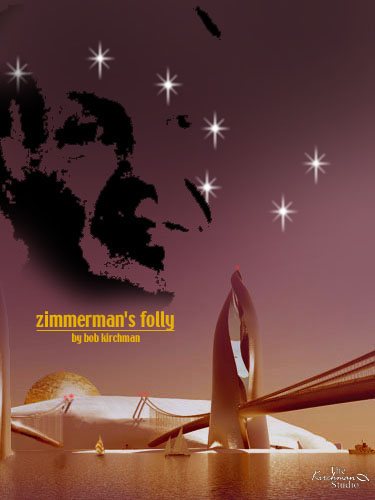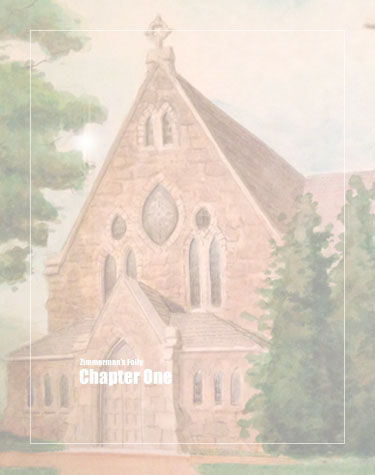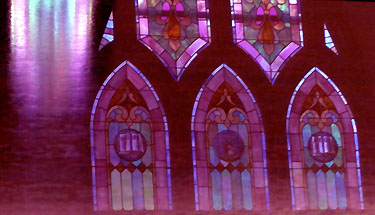
Volume XVII, Issue XI-002

‘The Day After Yesterday’
Global Warming Isn't About Observation Anyway
In 2007 we visited Alaska. Just outside Juneau we saw a glacier that was shrinking "due to global warming." Later we sailed past the mighty Hubbard Glacier, which is "growing due to global warming." How can both be true?
Easy! In the world of climate 'science' the observed phenomena simply are added to the narritive for the desired result. The 'coming ice age' was recast as 'global warming,' remember.
Back in the early sixties, my brothers and I went to see the movie Voyage to the Bottom of the Sea. It's been a while but here's the plot synopsis:
A new research submarine takes to the seas [conveniently fitted with Polaris missles, more on that later] and embarks on her maiden voyage. It was a cool submarine too. There was a shark tank somewhere in her midsection. The sub's most interesting feature was a gigantic bay window in the prow for observing giant squid and other Jules Verne inspired monsters that will attack it during the course of the film.
Life in the research sub is humming along when suddenly the Van Allen belt, a radiation field around the Earth, catches fire. My father, a NASA engineer, chuckled at this one. It is impossible for a radiation field in space to catch fire. Still it made for a pretty good Earth-threatening disaster film.
The plucky scientists on the Seaview devise a means to put out the fire in the Van Allen belt but they have to argue their case before the United Nations. The fire is really heating up now and all the scenes in New York are shot through a red lens. To a ten year old it was pretty ominous. Their plan involves shooting a Polaris into the belt and exploding it.
True to form the United Nations debate ends in a denial of permission for the mission and the sub is now stuck in New York Harbor with blue helmets guarding every inch of her. Now the brave captain makes the decision to do it anyway. He submerges the sub and leaves the blue helmets swimming as he makes his escape.
Now he must evade the navies of the world. He must submerge to depths unimagined and face the perils of giant squid and other such creatures. Finally he is able to fire the missle and the Van Allen Belt fire is blown out! Hooray for American ingenuity and spirit!
They knew how to make good movies back then!
Fast forward to a few years ago. The kids brought home a movie called "The Day After Tomorrow." It too is a junk science disaster film but this time global warming causes super-sized hurricanes that somehow create a major chill down of whatever part of the Earth they cover... global warming causing freezing!
The movie is an odd juxtaposition of climate penance and self actualization as scientist Dad rescues his kid and his kid's girlfriend who are on a field trip to New York when this happens. Plucky son saves everybody from freezing by burning books in the New York Public Library. Young love blossoms as the world goes to hell. Inwardly I'm shouting "where's your Polaris missle?" There is no heroic effort to blow out the monster storms that I can see. The movie ends with a scene guaranteed to warm any leftist's heart. The United States is covered with Ice and the survivors are all refugees to Mexico "if they'll let us in." Of course, that is the real point of the movie anyway.
In my mind I rewrite the ending. In my version the scientist must choose between saving his son and saving the people of the United States. He makes the heroic choice.
Scientist goes against the United Nations and launches storm busting missles out of our Midwest silos. Storm is knocked out but scientist sacrifices rescuing son and stupid girlfriend who freeze in the New York Public Library because the librarian will not allow the defacing of books.
My ending would have been better.

Hubbard Glacier.

Mendenhal Glacier near Juneau.
Resurrection’s Essential Place
A long time ago, I went to an Easter service at a large mainline church. The pastor’s message included his thought that “the Resurrection wasn’t all that important.” Somehow that seemed so wrong. Resurrection is EVERYTHING. Resurrection is the Bright Shining One building a Bridge between God and Man. Resurrection is the essence of our Gospel. So, I thought, what’s left if there is no significance in Resurrection? The associate minister’s message to the children on the steps about saving tin cans? In one brush the Church is reduced to but another institution for promoting good values. Certainly the promotion of good things is a worthwhile pursuit, but if there is something more significant in our Faith, let it shine!
Dr. John Mackay was a missionary to Peru. Father Henri Nouwen was a priest who was in Peru. Both made an observation of the ‘Christianity’ that was put forth in the time of the Spanish conquistadors. As Peru was subjugated in the time of Spanish rule, there was something notably absent. Nouwen writes: “Nowhere did I see a sign of the resurrection, nowhere was I reminded of the truth that Christ overcame sin and death, and rose victorious from the grave. All was Good Friday. Easter was absent… The nearly exclusive emphasis on the tortured body of Christ strikes me as a perversion of the Good News into a morbid story that intimidates… people but does not liberate them.”
Resurrection then is MOST IMPORTANT. Resurrection is what gives us the ability to commune with our Living God! Without it our Faith is meaningless, to be sure, but it can be twisted into something much worse.

Volume XVII, Issue XI-002

Do not remember the former things, nor consider the things of old. Behold I do a new thing, Now it shall spring forth; Shall you not know it? I will even make a road in the wilderness and rivers in the desert." Isaiah 43:18-19
When peace like a river attendeth my way..."
Kris' beautiful soprano voice carried the old hymn as it filled the little church on Big Diomede. The memorial service for Rupert Zimmerman had begun. After successfully building and operating the twin spans across the Diomedes that linked Siberia to Alaska, Zimmerman had embarked on a venture to build a more Southern crossing across St. Lawrence Island. Though the day of the groundbreaking dawned with a chill and an icy rain, the old man had insisted on turning the first spade of earth. He returned to Wales and took sick, never to leave his bed again. At ninety-three years of age, Rupert Zimmerman succumbed to pneumonia.
His wife Pat and daughter Elizabeth were by his side as he passed away, Elizabeth's husband Martin and the next generation of children came in and out of the room quietly, but constantly. The loner who had fought all odds to build what had never been built before now basked once more in the joy of family! Pat tried to keep him on a healthy diet to the very end but Kris sneaked in a big dish of macaroni and cheese anyway. The aroma carried Zimmerman back to memories of big dinners with extended family in the big white farmhouse in Virginia. His eyes closed for the last time after a grandchild had done something naughty in the room... prompting a scolding from her mother, while reminding Zimmerman of a similar incident of shared complicity with a favorite cousin! Pat saw through her tears, she thought, a smile... no, was it a mischievous grin?, then the old man was at last at peace.
Kris fought tears as she brought the hymn to a close. Her husband rose to give, or so everyone thought, the eulogy. Though his eyes were red, his face had a look of mischief upon it as he produced a letter. "We are here to remember Rupert Zimmerman, a man who always had to have the last word. Well, true to form, Mr. Zimmerman handed this to me a few days ago." Some people chuckled quietly. Greene continued: "Rupert Zimmerman's story is an unusual one, to be sure. No doubt he will go down in history for his foresight and perseverance in building one of the great wonders of the world. That, Mr. Zimmerman felt, would be a gross oversimplification."
Dear Friends, and those who would never call me friend, dare I say you who will never find it in your heart to forgive me,
I do not want to be enshrined as the hero I am not, nor do I wish to be simply reviled as the monster I indeed was. Please humor a dying man and listen to my story:"
Zimmerman began with a description of the day he and Martin O'Malley had camped on the mountain at Wales, having secured the capital and commitment necessary to build his great bridge. They'd brought a large quantity of Guinness along to toast their new venture. Staring across the Strait at midnight, they began to raise their glasses in salutes, both lofty and unprintable, to the great work they were about to embark on. They succeeded in getting terribly drunk and setting their tent on fire, destroying their provisions. Ashamed to drag themselves back into Nome early, they slept under the stars and ate the flora that they'd learned about in survival training. They'd concocted a story about getting very sick but Elizabeth knew her father and her husband too well to buy it. To her credit, she'd let them keep it.
Elizabeth was the Zimmerman's youngest daughter, but she was the one who was kindred spirit to her dad. Pat rolled her eyes thinking of how they'd conspired to bring ice cream into the house time after time during her girlhood. Rupert and Elizabeth had hiked some of the Appalachian Trail together and they had formed a bond that had carried well into their working life. Zimmerman had gone though a slew of assistants before bringing Elizabeth in saying: "Try this and see if you like it, if you do we'll make a job for you here." Elizabeth had the uncanny ability to read her father. She could call him on a questionable decision but knew him well enough to tolerate his seeming to follow rabbit trails. More than once she'd 'reconstructed' documents that he'd misplaced or simply forgotten rather than make a scene demanding them.
She and Martin had both put their foot down when Zimmerman had demanded the Big Diomede Ship Crossing Suspension Bridge not run over what he'd originally budgeted. Cost overruns were threatening to stop the project and investors were ready to bail, but the cheaper span resulted in a short suspension span that rose and fell rapidly, creating a 'blind hill' for drivers approaching the top of the arc. Zimmerman was never much for saying: "I can't afford it.", but his clear proclamation: "Bad bridge or no bridge." was something even Zimmerman's closest colleagues, his son-in-law and daughter couldn't argue with.

(to be continued) [click to read]
[click to read ]
Copyright © 2015, The Kirchman Studio, all rights reserved